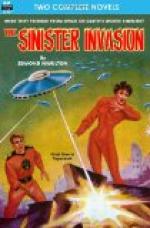Another mile, this time on the hard road. It seemed strange to walk on so unyielding a surface after so many miles on quite different kinds of footing. It was almost sunset now. There was a farmhouse set well back from the road and barely discernable beyond nearby growing corn. The house seemed dead. It was neat enough and in good repair. There were clackings of chickens from somewhere behind it. But it had the feel of emptiness.
Lockley called. He called again. He went to the door and would have called once more, but the door opened at a touch.
“Evacuated,” he said. “Did you notice that there was a telephone line leading here from the road?”
He hunted in the now shadowy rooms. He found the telephone. He lifted the receiver and heard the humming of the line. He tried to call an operator. He heard the muted buzz that said the call was sounding. But there was no answer. He found a telephone book and dialed one number after another. Sheriff. Preacher. Doctor. Garage. Operator again. General store.... He could tell that telephones rang dutifully in remote abandoned places. But there was no answer at all.
“I’ll look in the chicken coops,” said Jill practically.
She came back with eggs. She said briefly, “The chickens were hungry. I fed them and left the chicken yard gate open. I wonder if the beam hurts them too?”
“It does,” said Lockley.
He made a light and then a fire and she cooked eggs which belonged to the unknown people who owned this house and who had walked out of it when instructions for immediate evacuation came. They felt queer, making free with this house of a stranger. They felt that he might come in and be indignant with them.
“I ought to wash the dishes,” said Jill when they were finished.
“No,” said Lockley. “We go on. We need to find some soldiers, or a telephone that works....”
“I’m not a good dishwasher anyhow,” said Jill guiltily.
Lockley put a banknote on the kitchen table, with a weight on it to keep it from blowing away. They closed the house door. They’d eaten fully and luxuriously of eggs and partly stale bread and the sensation was admirable. They went out to the highway again.
“West is still our best bet,” said Lockley. “They’ve blocked the highway to eastward with that terror beam.”
The sun had set now, but a fading glory remained in the sky. They saw the slenderest, barest crescent of a new moon practically hidden in the sunset glow. They walked upon a civilized road, with a fence on one side of it and above it a single sagging telephone wire that could be made out against the stars.
“I feel,” said Jill, “as if we were almost safe, now. All this looks so ordinary and reassuring.”
“But we’d better keep our noses alert,” Lockley told her. “We know that one beam comes nearly this far and probably—no, certainly crosses this road. There may be more.”




